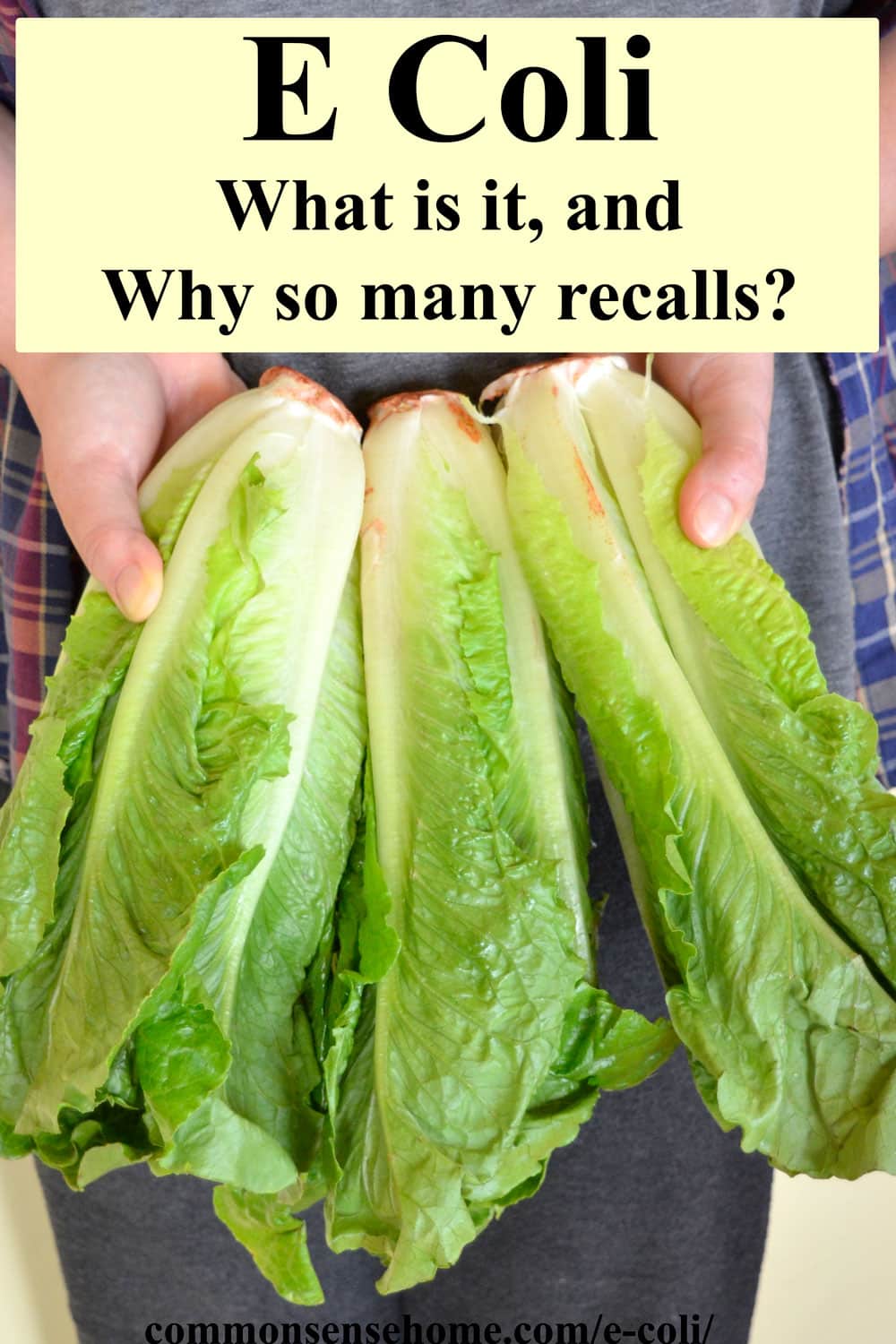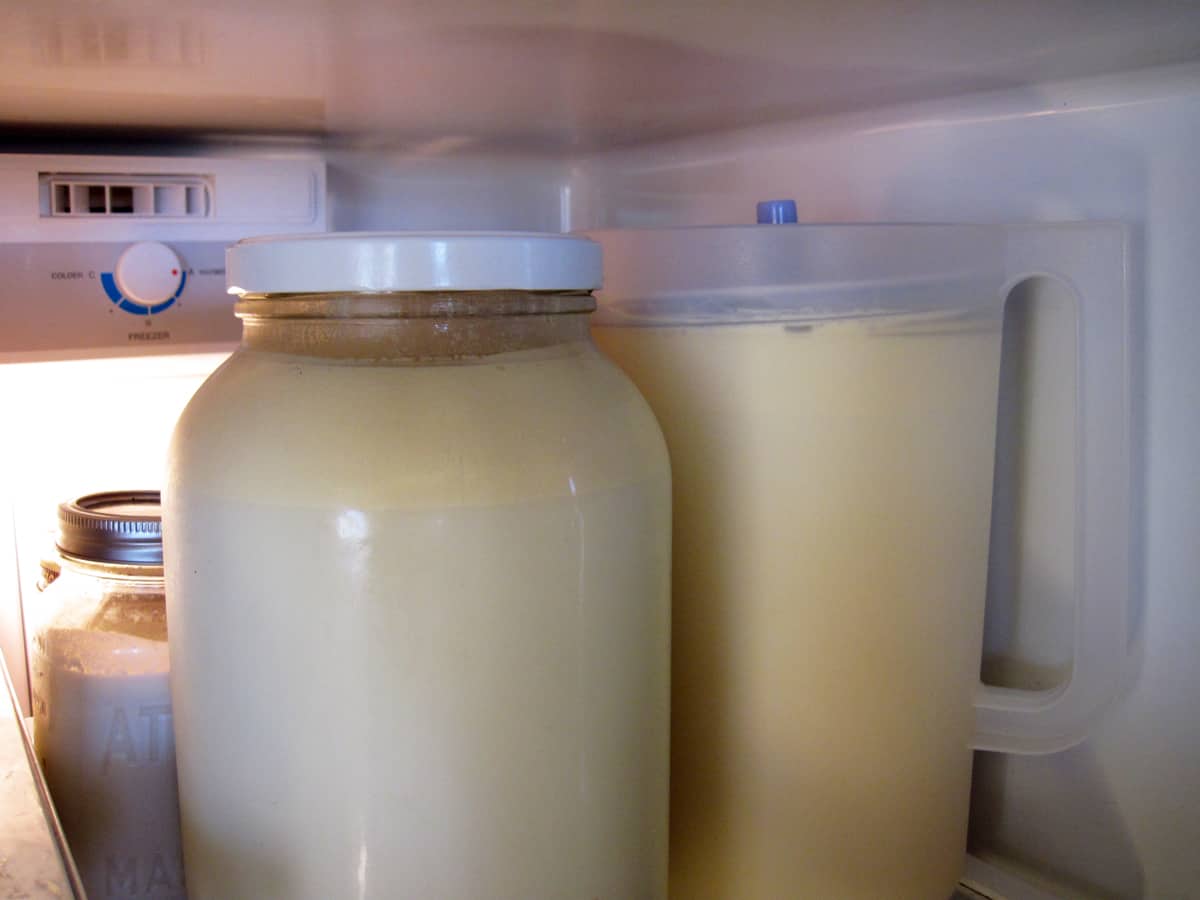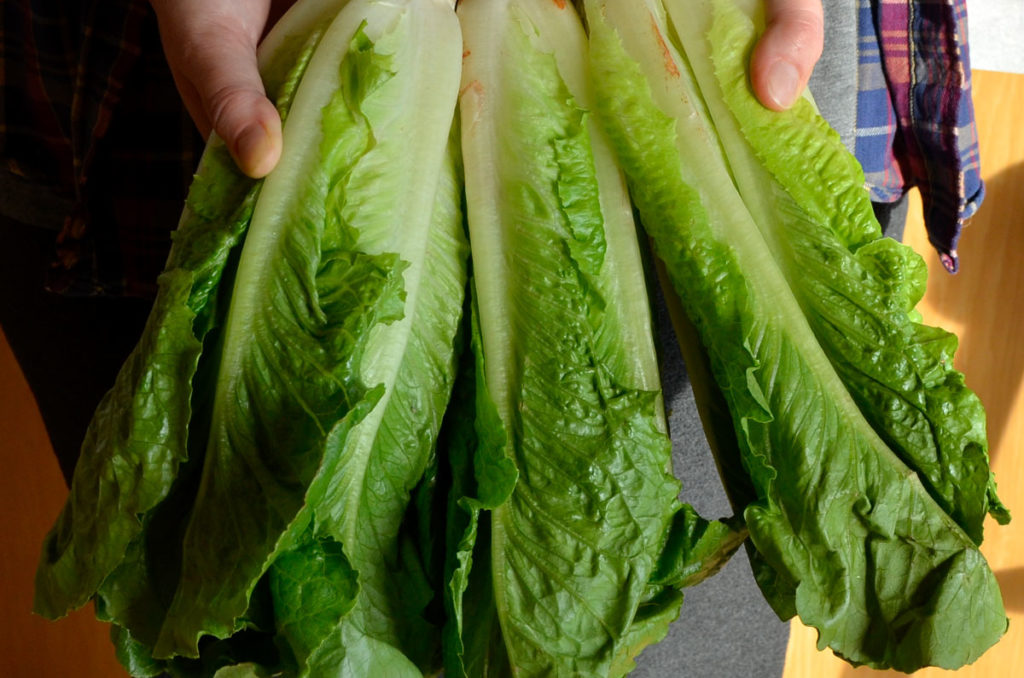E Coli – What is it, and Why so many recalls?
Lately it seems like not a week goes by without another recall for food contaminated with e coli. It's in lettuce, flour, ground beef, chopped fruit and more. We'll cover what's going on with all the e coli recalls, what you can do to avoid getting sick, contamination sources, symptoms and when to see a doctor.

What is e coli?
E coli (Escherichia coli) are a type of fecal coliform bacteria that live in your intestines. Most e coli are harmless, and are a normal, healthy part of your digestive tract.

E coli bacteria also lives in other warm blooded animals, such as:
- pigs
- cows
- dogs
- deer
- poultry
There is more than one strain or type of E coli – and that's where we run into trouble. (More information on this below.) Sometimes animals act as carriers of strains that are dangerous to humans – without having symptoms.
Why is E Coli dangerous?
Strains of E coli, such as e coli O157 h7, can cause food poisoning. Most people recover within 5 to 7 days, but this illness may be life threatening for people with weakened immune systems.
Symptoms
Symptoms appear within 1 to 10 days of exposure – which is one of the reasons outbreaks are so tough to track. How fast you get sick depends on the type of bacteria and how much was ingested.
The CDC notes that symptoms of Shiga toxin-producing E. Coli (STEC) vary, but may include:
- nausea and vomiting
- severe abdominal pain and cramping
- diarrhea (including bloody diarrhea)
- fever less than 101°F/38.5 °C
More a more severe case of infection can result in:
- Unexplained bruises
- Unusual Bleeding
- Extreme or Constant Fatigue
- Kidney (urinary tract) infection, decreased urine output or hemolytic uremic syndrome (HUS)
- Confusion and/or seizures
Per the CDC and medical texts, E coli can cause also cause pneumonia, bladder infections and even kidney failure from some of the more virulent dangerous strains of the bacteria. Studies estimate that E coli causes up to 80% of urinary tract infections.
When to See a Doctor
Per CDC recommendations – Please see a trained healthcare provider if you have:
- Diarrhea that lasts for more than 3 days or diarrhea with a fever over 102ºF/38.8ºC
- Blood in your stool
- Extreme vomiting with dehydration (can't keep liquids down, not peeing)
How do I get an e coli infection?
Most people get E Coli from drinking fouled water or eating contaminated food. The most common sources of infection are:
- Foods such as lettuce, ground beef, fruit, flour
- Contaminated water
- Feces (bathroom surfaces) especially cleaning up small children or other areas that have feces
- Animals at farms, petting zoos and fairs
Remember – this bacteria likes to hang out in the intestinal tract. It needs a host to live for longer periods of time. It can live inside an animal, or inside a plant. A washed countertop won't keep it alive, but leave your counter coated with food grime, and the bacteria may live long enough to find a new host.
Risk for person to person transmission is low, unless you are in close contact with a person who has a virulent strain. For instance, if a loved one has explosive diarrhea, and you're in charge of clean up, there's a risk of exposure. Wash hands and surfaces frequently and thoroughly.
Transmission between human and animal typically involves feces, or feces contaminated meat. Wash hands after contact with animals, cook meat (especially meat from large processing facilities that contains more than one animal) thoroughly.
Although unpasteurized milk is commonly demonized as potential source of foodborne illness, you'll note that recent recalls do not include raw milk. I was raised on a dairy farm and we regularly drank raw milk with no issues. (I can't drink ultrapasturized milk because it upsets my stomach, but that's a story for another article.)

How do things get contaminated?
It's all about the poop. Remember, we're dealing with fecal coliform bacteria. No feces, no starter culture of bacteria.
The trick is that although it starts in the feces, it can live in other tissue (like lettuce). It can also linger on improperly cleaned surfaces long enough to transfer to another food.
When the FDA was looking into the romaine lettuce e coli O157:H7 outbreak, they examined six main contamination sources:
- agricultural water
- soil amendments
- growing and harvesting practices
- animal intrusion
- adjacent land use
- employee health and hygiene practices
Their conclusion was that irrigation water was the most likely culprit, but growers also suggested that there might be windborne contamination. There's no absolute way to tell.
One step farmers are taking to try and prevent outbreaks is to treat irrigation water to “reduce the risk of bacterial presence“. Chlorine is the most used option at this time, but may not be getting the job done.
The studies “Antibiotic-resistant indicator bacteria in irrigation water” and “Reclaimed water as a reservoir of antibiotic resistance genes: distribution system and irrigation implications” show we're dealing with bacteria that's resistant to standard methods of control.
Sanitation in farm fields is often poor, so workers don't have proper toileting or hand washing facilities. This may also play a part in contamination.
Why is E Coli getting worse?
More dangerous strains of E Coli are being reported more frequently. This is likely the result of over use and incorrect use of antibiotics. Certain strains of E Coli get more dangerous if exposed to antibiotics. Wastewater treatment plants often have limited options to clear pharmaceutical residue.
There is widespread use of antibiotics in the healthcare, homes, farms and throughout the food chain. We use far too many and are breeding antibiotic resistant strains of bacteria like e coli.
There are rumors of food poisoning being used as a weapon of terror, but at this time there is no conclusive evidence of such an attack.

How can I avoid E Coli?
There are a number of ways you can protect yourself from the dangerous versions of E Coli.
- Wash your hands after going to the bathroom. Wash your hands before eating.
- Avoid touching your face and mouth. Bacteria and viruses are primarily transmitted through the eyes, nose and mouth.
- Be careful of water. If you suspect water is contaminated, boil it or drink bottled water.
- Completely cook any beef, pork or chicken to 160°F/71.1°C (or higher), testing with a meat thermometer.
- Clean kitchen work surfaces with hot, soapy water after processing meat or vegetables.
- Completely clean any feces/diarrhea. Use bleach as needed. Bleach, vinegar and/or alcohol will kill bacteria.
- Wear gloves if you have any wounds on your hands to avoid contact infection.
Shorten your food chain. Most e coli contamination recalls involve products shipped for long distances over a wide area – not small, local production.
Tweet
Related Posts
- 4 Reasons Wooden Cutting Boards are Best
- Protect Yourself from Salmonella and E Coli Naturally
- Honey as Medicine
Do you have more questions or comments about the recent recalls? Leave a comment and share your thoughts.


All of the e-coli reports always surprise me. I live on property with various animals and like many around me, garden using the same fertilization, disposal and land maintenance techniques as our great-great grandfathers. The very techniques we are told by agencies are supposed to make us sick do not seem to cause the contamination problems like large operations. I always wonder what large operations are doing so differently that cause these illnesses. Thank you for the well written and researched information.
I think there are a lot of different factors, but by default, small (healthy) diversified operations naturally breed less nasty pathogens.
It is not a coincidence that the ecoli in lettuce is from California, occasionally Arizona. In the areas where the lettuce is grown a major industry is cattle feedlots. It is not being pointed out by anyone in order to favor the cattle business. Neither CA nor the Feds will make any rules to prevent the irrigation water from getting polluted. The best idea would be to avoid buying lettuce, spinach, etc., from CA or AZ.
All that manure has to go somewhere. The CAFO effect gets lumped into the rest of the water contamination issues.
I haven’t seen any recalls on organic greens, but that may only be a matter of time.